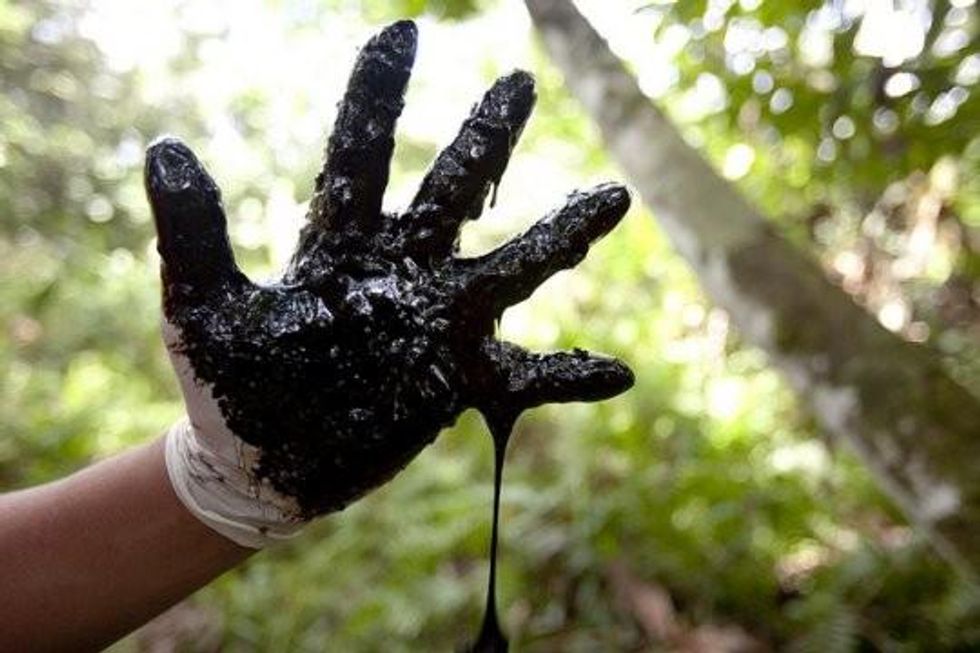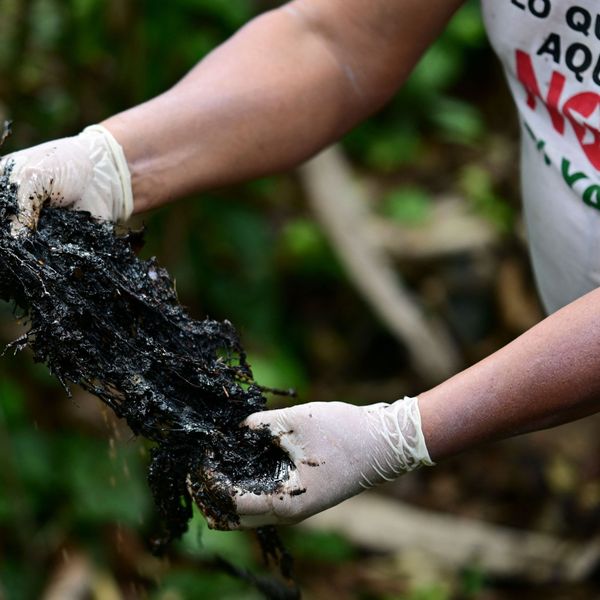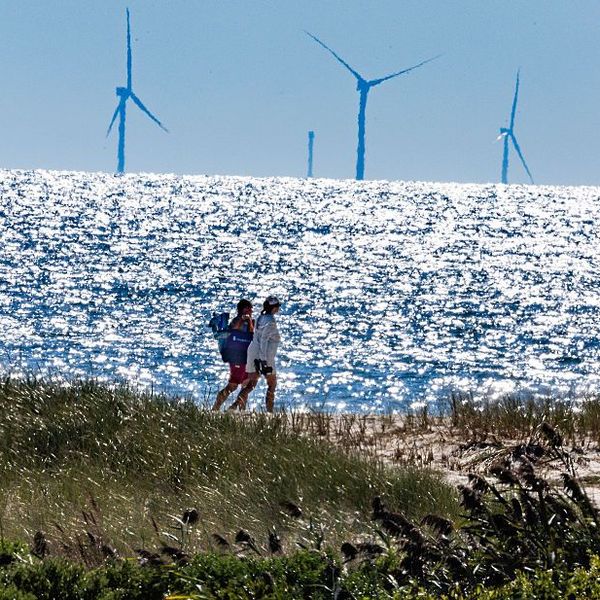Chevron Wins Big With 'Appalling' Court Ruling
Justice for victims of oil giant's toxic legacy continues to be evaded

Critics of the ruling say it means further injustice for the tens of thousands of Ecuadoreans who continue to live with the legacy left by Texaco, which was acquired by Chevron in 2001, from its dumping toxic waste and spilling millions of gallons of crude oil between 1964 and 1992, creating what has been dubbed a Chernobyl in the Amazon which has sickened both ecosystems and communities.
The New York Times reports:
Central in the decision was Judge Lewis A. Kaplan's view of Steven Donziger, a Manhattan lawyer who has led the legal effort but who was accused by Chevron of ghostwriting a crucial report submitted to the Ecuadorean court to decide the case and even participating in the bribing of the deciding judge. Chevron sued Mr. Donziger and several associates, accusing them of masterminding a conspiracy to extort from and defraud the corporation.
Among the witnesses was Ecuadorean judge Nicolas Zambrano, who issued the 2011 ruling. He said that he had not received payment or outside assistance in coming to his decision.
Though Kaplan found that Chevron "might bear some responsibility" for the pollution, Reuters reports that his ruling "bars Donziger and the villagers from enforcing the Ecuadorean ruling in the United States. It may also give Chevron legal ammunition in other countries where the plaintiffs could try to go after Chevron's assets."
Amazon Watch, a nonprofit organization and ally of the affected Ecuadoran villagers, denounced Kaplan's ruling as "misguided" and a sign of corporate power trumping justice for the people.
Donziger said the ruling ignored the company's environmental crimes.
"With all due respect to the court, this is an appalling decision resulting from of a deeply flawed proceeding that overturns a unanimous ruling by Ecuador's Supreme Court. We believe Judge Kaplan is wrong on the law and wrong on the facts and that he repeatedly let his implacable hostility toward me, my Ecuadorean clients, and their country infect his view of the case," he said in statement.
"This decision is full of vitriol, is based on paid evidence from a corrupt former judge, and ignores the overwhelming evidence that Chevron committed environmental crimes and fraud in Ecuador," Donziger continued. "Through this decision, we now have the spectacle of a Manhattan trial judge purporting to overrule Ecuador's Supreme Court on questions of Ecuadorian law. All of these factual and legal issues will be addressed in due course on appeal. We are confident we will be fully vindicated in the U.S., as we have been in Ecuador."
Chevron called the ruling a "resounding victory."
____________________
An Urgent Message From Our Co-Founder
Dear Common Dreams reader, The U.S. is on a fast track to authoritarianism like nothing I've ever seen. Meanwhile, corporate news outlets are utterly capitulating to Trump, twisting their coverage to avoid drawing his ire while lining up to stuff cash in his pockets. That's why I believe that Common Dreams is doing the best and most consequential reporting that we've ever done. Our small but mighty team is a progressive reporting powerhouse, covering the news every day that the corporate media never will. Our mission has always been simple: To inform. To inspire. And to ignite change for the common good. Now here's the key piece that I want all our readers to understand: None of this would be possible without your financial support. That's not just some fundraising cliche. It's the absolute and literal truth. We don't accept corporate advertising and never will. We don't have a paywall because we don't think people should be blocked from critical news based on their ability to pay. Everything we do is funded by the donations of readers like you. Will you donate now to help power the nonprofit, independent reporting of Common Dreams? Thank you for being a vital member of our community. Together, we can keep independent journalism alive when it’s needed most. - Craig Brown, Co-founder |

Critics of the ruling say it means further injustice for the tens of thousands of Ecuadoreans who continue to live with the legacy left by Texaco, which was acquired by Chevron in 2001, from its dumping toxic waste and spilling millions of gallons of crude oil between 1964 and 1992, creating what has been dubbed a Chernobyl in the Amazon which has sickened both ecosystems and communities.
The New York Times reports:
Central in the decision was Judge Lewis A. Kaplan's view of Steven Donziger, a Manhattan lawyer who has led the legal effort but who was accused by Chevron of ghostwriting a crucial report submitted to the Ecuadorean court to decide the case and even participating in the bribing of the deciding judge. Chevron sued Mr. Donziger and several associates, accusing them of masterminding a conspiracy to extort from and defraud the corporation.
Among the witnesses was Ecuadorean judge Nicolas Zambrano, who issued the 2011 ruling. He said that he had not received payment or outside assistance in coming to his decision.
Though Kaplan found that Chevron "might bear some responsibility" for the pollution, Reuters reports that his ruling "bars Donziger and the villagers from enforcing the Ecuadorean ruling in the United States. It may also give Chevron legal ammunition in other countries where the plaintiffs could try to go after Chevron's assets."
Amazon Watch, a nonprofit organization and ally of the affected Ecuadoran villagers, denounced Kaplan's ruling as "misguided" and a sign of corporate power trumping justice for the people.
Donziger said the ruling ignored the company's environmental crimes.
"With all due respect to the court, this is an appalling decision resulting from of a deeply flawed proceeding that overturns a unanimous ruling by Ecuador's Supreme Court. We believe Judge Kaplan is wrong on the law and wrong on the facts and that he repeatedly let his implacable hostility toward me, my Ecuadorean clients, and their country infect his view of the case," he said in statement.
"This decision is full of vitriol, is based on paid evidence from a corrupt former judge, and ignores the overwhelming evidence that Chevron committed environmental crimes and fraud in Ecuador," Donziger continued. "Through this decision, we now have the spectacle of a Manhattan trial judge purporting to overrule Ecuador's Supreme Court on questions of Ecuadorian law. All of these factual and legal issues will be addressed in due course on appeal. We are confident we will be fully vindicated in the U.S., as we have been in Ecuador."
Chevron called the ruling a "resounding victory."
____________________

Critics of the ruling say it means further injustice for the tens of thousands of Ecuadoreans who continue to live with the legacy left by Texaco, which was acquired by Chevron in 2001, from its dumping toxic waste and spilling millions of gallons of crude oil between 1964 and 1992, creating what has been dubbed a Chernobyl in the Amazon which has sickened both ecosystems and communities.
The New York Times reports:
Central in the decision was Judge Lewis A. Kaplan's view of Steven Donziger, a Manhattan lawyer who has led the legal effort but who was accused by Chevron of ghostwriting a crucial report submitted to the Ecuadorean court to decide the case and even participating in the bribing of the deciding judge. Chevron sued Mr. Donziger and several associates, accusing them of masterminding a conspiracy to extort from and defraud the corporation.
Among the witnesses was Ecuadorean judge Nicolas Zambrano, who issued the 2011 ruling. He said that he had not received payment or outside assistance in coming to his decision.
Though Kaplan found that Chevron "might bear some responsibility" for the pollution, Reuters reports that his ruling "bars Donziger and the villagers from enforcing the Ecuadorean ruling in the United States. It may also give Chevron legal ammunition in other countries where the plaintiffs could try to go after Chevron's assets."
Amazon Watch, a nonprofit organization and ally of the affected Ecuadoran villagers, denounced Kaplan's ruling as "misguided" and a sign of corporate power trumping justice for the people.
Donziger said the ruling ignored the company's environmental crimes.
"With all due respect to the court, this is an appalling decision resulting from of a deeply flawed proceeding that overturns a unanimous ruling by Ecuador's Supreme Court. We believe Judge Kaplan is wrong on the law and wrong on the facts and that he repeatedly let his implacable hostility toward me, my Ecuadorean clients, and their country infect his view of the case," he said in statement.
"This decision is full of vitriol, is based on paid evidence from a corrupt former judge, and ignores the overwhelming evidence that Chevron committed environmental crimes and fraud in Ecuador," Donziger continued. "Through this decision, we now have the spectacle of a Manhattan trial judge purporting to overrule Ecuador's Supreme Court on questions of Ecuadorian law. All of these factual and legal issues will be addressed in due course on appeal. We are confident we will be fully vindicated in the U.S., as we have been in Ecuador."
Chevron called the ruling a "resounding victory."
____________________

